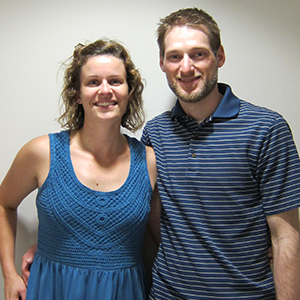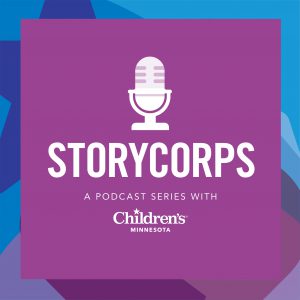Hemophilia: Abby and Dylan’s story


About this episode
Parents Abby and Dylan discuss their experience with their son, Evan, and his diagnosis of Hemophilia A. As a couple, they have supported each other through the journey and have been empowered through the ability to do self infusions with Evan at home.
Topics:
- No family history
- Port placement
- Feeling helpless
- Promoting normalcy
- Empowerment of self infusions at home
Transcript
Abby: I never remember him having any bruises, never until a couple weeks after he started daycare, which means he was 13, 14 weeks old. We just didn’t know what to make of it.
Dylan: The final straw that broke the camel’s back to actually get it checked out was when (sister) was sick and you had to pick her up from daycare to bring her home and then bring her in to be checked out. It just so happened that there were two back-to-back appointments available at the doctor, so we thought, hey, while you’re there have the bruises looked at.
Abby: Have the bruises looked at and just see what the next step was to figure that out.
Dylan: You were there – I was not there – maybe you want to talk about how that visit went.
Abby: It was one of the hardest days of my life, I would say. [Crying] For starters, we had to see a pediatrician that wasn’t our normal doctor. We didn’t know this man; he didn’t know us. His first thing that he said to me was, “who put their hands on your baby? Who did this to him?” And I said, ‘I don’t know. I don’t have any answers. That’s why I’m here.’ He left the room. He came back with handwritten driving directions for the Children’s Resource Center in St. Paul, which is an abuse specialty center for kids. I lost it. I just, all of a sudden, feared that I might not leave with my children, [Crying] that they may be taken from us. I was so scared. It was a totally new kind of fear because before it was all worrying about Evan. Are they coming from outside or are they coming from inside, the bruises?
All of a sudden it was this whole new kind of fear and it was a lot. And after 40 minutes, finally the doctor sat down in a chair with Evan on her lap and said, ‘it’s amazing how happy he is. He’s so happy.’ [Crying] I said, ‘of course he is.’ Kids she sees maybe don’t have the good life that Evan has. She said, ‘the good news is I don’t feel like the bruises are from mishandling or aggressive handling or any type of abuse or mistreatment.’ And then it really hit me like a truck that if they’re not coming from outside, then they’re coming from inside. Our terrified Google searches of, ‘why does my baby have bruises?’ revealed some not very fun answers. So I asked the doctor, ‘if they’re not coming from outside, then what’s causing them?’ She said, ‘I don’t have answers for you. Today is not a day of answers for you. This is the start of something bigger I think.’
I got home and you were there and we just kind of cried. We were so scared for our boy and what this might mean for him and for our family. [Crying] He was four months, five months by the time we got in here and he was pretty regularly covered with at least five to eight bruises at any given time, big lumpy bruises. The first hematologist came in and didn’t really say anything to us. He just looked at him and was like, ‘I’m going to go grab someone who deals with a bit more, because this isn’t my real specific area of expertise,’ and he came back with Dr. Margaret, who spent the entirety of 30 seconds basically before it seemed like she knew what was going on, and spent the entire day with us.
I just went into this denial, I suppose, to put it out there. No, our son doesn’t have this chronic disease that you’re talking about. What sticks out the most in my mind is two things. One, she said it’s the most expensive thing that can happen. And then two, the other big thing that really stood out in my mind was how difficult it was to try and give him his first dose of factor. They could not place a peripheral IV.
Dylan: With ultrasound techs…
Abby: They tried five or six different sites, at least…
Dylan: That wasn’t too uncommon for like his whole first year…
Abby: That was our experience.
Dylan: That was our experience for the full first year, coming in a couple times a week.
Abby: We’re very regimented with always infusing in the morning. We infuse every day we’re supposed to and we’re very regimented and strict in that regard with him, but we let him try anything he wants to try. If he wants to sit on a big kids swing, he sits on a big kids swing. If he wants to climb at the park, then he climbs at the park.
Dylan: I think from day one we’ve just taken this as this is just something that he has; it’s not who he is. We’re not allowing it to restrict his abilities to try new things.
Abby: Absolutely. We’re not going to be the ones to restrict him from trying new things. We’re going to let him try whatever he wants to try. The bruises really bothered me, how significant his bruising was, just in how many he had and how severe they were and how big they were. It was hard to go to the pool. I always wanted him in a full-blown swimsuit because I felt bad for him and for us and whatever. We got stared at; we just did. It bothered me, just wondering what’s going through that person’s head right now as they’re looking at all these bruises on this sweet little blonde boy. We were empowered through the use of the port to be able to infuse him ourselves and we just pack up his stuff and we go. It was 15 minutes on one of the mornings that we were gone and that was it. He was a normal kid. We were a completely normal family the whole rest of the time. We just had to pack a few medical supplies before we left. It was awesome!
Dylan: The port was such a change in the way that we’ve handled all this. Before that we had lost some of the power in the situation. We had to watch him be pinned down and have somebody else try to infuse him.
Abby: Helpless feeling that it was…
Dylan: Yeah, and you just watch your child cry and it’s very disheartening when you’re doing that a couple times a week. I think both of us have been very strong in this whole thing. I think there were times where we shed a tear here and there, but it wasn’t I don’t think in any way feeling sorry for ourselves. Maybe it’s somewhat feeling sorry for him in that this is just something that he’s going to have to manage throughout his life. I think we’ve been incredibly strong for him and for each other working through this. I think we’ve attacked it head-on, so I would definitely advise others to do the same. Don’t shy away. Dig into the details. Take the power back from the situation.
Abby: The best way to re-empower yourself is to learn about it and learn how to do it. It was when we didn’t know how to infuse him ourselves that we felt the most helpless and removed. As soon as we were able to infuse him ourselves, and it was a huge moment when we each did our first totally independent infusion, where it was just me and just Evan and then it was just you and just Evan. That was quite a moment for both of us.
We wish to extend our thanks to the families who have shared their story here about the impact of living with hemophilia and sickle cell disease. We would also like to thank the many who worked on this project:
The Children’s Minnesota StoryCorps Legacy Team:
Eddie Gonzalez, Jocelyn Bessette Gorlin, Susan Kearney, Stephen Nelson, Margaret Heisel-Kurth, Stephanie Davis, Angela Blue, Elizabeth McDonough, Jill Swenson and Alisa Linne.
Special thanks to:
Stephanie Moua, Hamdi Hussein, Sadia Farah, Fatima Ali, Caillyn Costello, Suzanne Lehman, Suzan Ulrich, D'Ann Urbaniak Lesch, Justin Nelson, Allison Albright, Marvin Holmes-Leopold, Jose Rodriguez and Mitch Hare.
Minneapolis Institute for Production and Recording:
Jose Rodriguez and Mitch Hare.